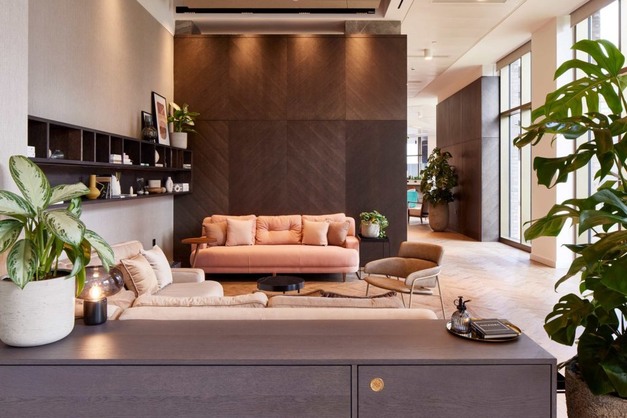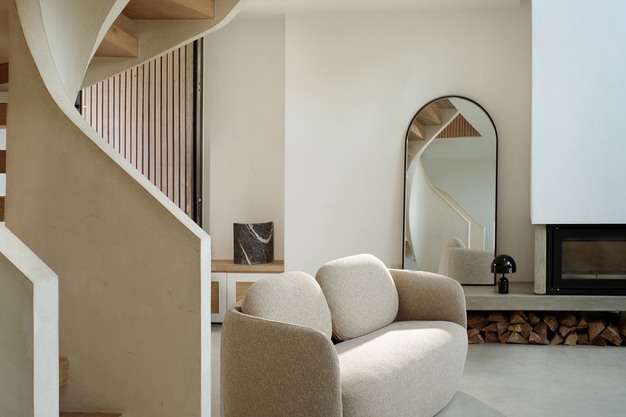With work and life patterns becoming more fluid, what we need from professional spaces has evolved to become less clear cut. We yearn for the comforts of domesticity to be translated into the realms of hospitality; with offices, hotels and restaurants needing to offer less singularity in their function and embrace the multiplicity in which we operate.
Navigating these changes can be creatively challenging, but also liberating. As we release ourselves from the constraints and formality of single use spaces, we welcome a more interesting design dynamic, with its modern language of flexibility, pleasure and comfort. To support you in embracing this design evolution, Morgan has created seven simple guiding principles for interior designers and contract furniture manufacturers to collaborate, opening up the conversation and offering new points of view.
1. What does your space need?
Interior design shouldn't aim to make us feel one particular way. Instead, it should allow us to connect with ourselves and each other. Open plan offices can foster community, collaboration and openness, but they must also provide workers with more intimate, quieter moments to retreat and concentrate. Understanding the clients' briefs on a more conscientious level allows us to support them in the selection of collections that embrace flexibility, sharing advice on everything from functionality to finishes.

Novella project.
2. How can we embrace the flow?
We have recently noticed a shift in lobby design, as Morgan's clients create casual yet luxurious, entrances that not only envelop arriving guests, but also offer informal spaces for work and meetings. This duality of needs demands a creative use of space, fixtures and furnishings to accommodate visitor transience and dwell times whilst also creating a visual language that celebrates the location's spirit. Lobbies are no longer simple entrances, they are a space in their own right.
'We recently supported design studio SpaceInvader in creating a relaxed and welcoming entrance lobby for Novella, luxury contemporary apartments in a landmark building in Salford Manchester. Inspired by the natural landscape surrounding Novella's modern neighbourhood, we developed a complimentary palette with soft, blush pinks and elegant neutrals. A combination of stylish seating solutions that accommodate a variety of visits, helping create a design-conscious entrance for a vibrant development.'
3. Use nature to provide a nurturing space
There are countless studies supporting the connection between emotional and physical wellbeing and natural materials, with research showing that the use of wood in projects considerably lowers cortisol levels in our bodies. Every piece of furniture manufactured at Morgan is created using FSC Certified European wood that can be adapted to individual projects, with beautiful finishes in Beech, Ash, Oak and Walnut customisable and available to order in high volume.
4. Speak in volumes
Renowned interior designer Andrew Trotter noticed an interesting shift in hospitality design post pandemic: 'People don't want big anymore. They want to be looked after.' This creates a delicate balancing act in commercial spaces, as clients explore new and interesting ways to create intimacy while delivering the volume of furniture needed to fulfil practical needs.
5. Create contemporary spaces with an eye on the future
'From sketch to delivery, sapling to seat we believe in being close to our furniture's life cycle. When we collaborate with our clients to create a space, we understand the need for aesthetic flexibility and future proofing. Which is why we offer a repair and renew service for all our seating, helping prolong the life of every piece, by repairing or reupholstering according to customers' needs,' Morgan shares.

6. Make it personal
Hospitality briefs no longer feel like institutional design. With the need to make commercial spaces more comfortable, relaxed and multifunctional, there must be a certain therapeutic angle to design, in which furniture and wellbeing work in harmony to create interiors that are soothing and special. Restaurants can be restful, light filled sanctuaries or maximalist cocoons of colour.
7. Materiality matters
'An interesting use of materiality has the power to elevate a space. By offering a variety of wood finishes and fabrics, we give our clients the tools to bring a deeper level of tactility and visual interest, beyond the functional. Collections such as Barricane, with its beautiful and delicate cane backing or Kaya's graphic slatted support and loose upholstery bring a different dimension to design, enabling our clients to play with light and negative spaces in a more interesting way.'
More information:
Morgan
[email protected]
www.morganfurniture.co.uk
